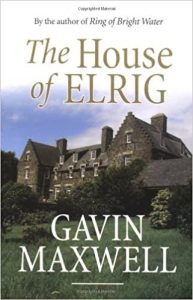Gavin Maxwell’s thoughtful, tortured account of his childhood is forever associated in my mind with Laurie Lee’s Cider with Rosie because both books were enthusiastically promoted by my teacher training college for what they would teach us about child development. I reread the latter and featured it here recently and that prompted me to go back, for the first time since about 1966, to Gavin Maxwell’s The House of Elrig (1965) which I now realise must have been hot off the press at the time.
Actually the two books couldn’t be more different although both authors became professional writers. Lee grew up in a humble home full of siblings in rural Oxfordshire. Maxwell, on the other hand, came from an aristocratic, landowning family. His mother was a Percy (the family name of the Dukes of Northumberland – see Shakespeare’s Henry IV part one, for example or visit Petworth House in Sussex). Maxwell is entertaining about the eccentric Percy uncles and their wives.
The Maxwells owned Monreith in Scotland and had an illustrious history of public service. The titular house which the young Maxwell loves with passion is on the Monreith estate and was home to him and his three siblings. His father was killed within hours of arriving at the front in France in the autumn of 1914 when Gavin, his youngest son, was three months old.

The adult Maxwell found fame as a naturalist and his Ring of Bright Water (1960) about his relationship with otters is unforgettable, not least because of the 1969 film starring Bill Travers. All the signs of what would occupy the adult Maxwell are clear in The House of Elrig although attitudes to natural history and animal welfare have changed a lot since the 1920s. It’s hard for the modern reader (this one, anyway) to accept that plundering birds’ nests, killing insects as collector’s items and shooting game birds were ever considered compatible with a love of nature.
The most striking thing in the this book, though, is the sheer misery Maxwell suffered in two out of three of his prep schools and, once he was thirteen in the two years he spent at Stowe. He was totally innocent of sex, for example, until he was in his mid teens, Teachers keep issuing wordy warnings which he doesn’t understand. If he is perceived to be getting friendly with another boy, because of a shared interest in oology for example, then both are punished – often physically. For a long time he has no idea what this adult anxiety is about. Of course there’s a lot of bullying too. Maxwell is shy, awkward and bemused.
Most of his teachers are terrible communicators and he is bored by them and what they’re trying to teach him. It’s a dreadful indictment on private education for boys between the wars. He spends much of his time in class dreaming of Elrig, walking round the estate in his head, looking at trees, wildlife, chatting to the gamekeeper and walking the paths. At one level it’s a very moving account of acute homesickness.
It’s interesting – amusing almost – how language and connotation has changed in 67 years. Maxwell describes the matron at Stowe, where he suffered a near fatal illness which finally put paid to his schooling, as “always kind, paedophile”. The word, of course, literally means “child loving” from Greek and, it seems that in 1965, you could use it to mean something perfectly pleasant and decent.
The House of Elrig is a good, uncompromising honest read with some beautiful descriptions of the natural world. And those lecturers at Bishop Otter College were right. It is also a compelling account of how it feels to be a child in a situation over which you have no control. How sad that Maxwell died (lung cancer) so young in 1969 at only 55.
Next week on Susan’s Bookshelves: The Building of Jalna by Mazo de la Roche